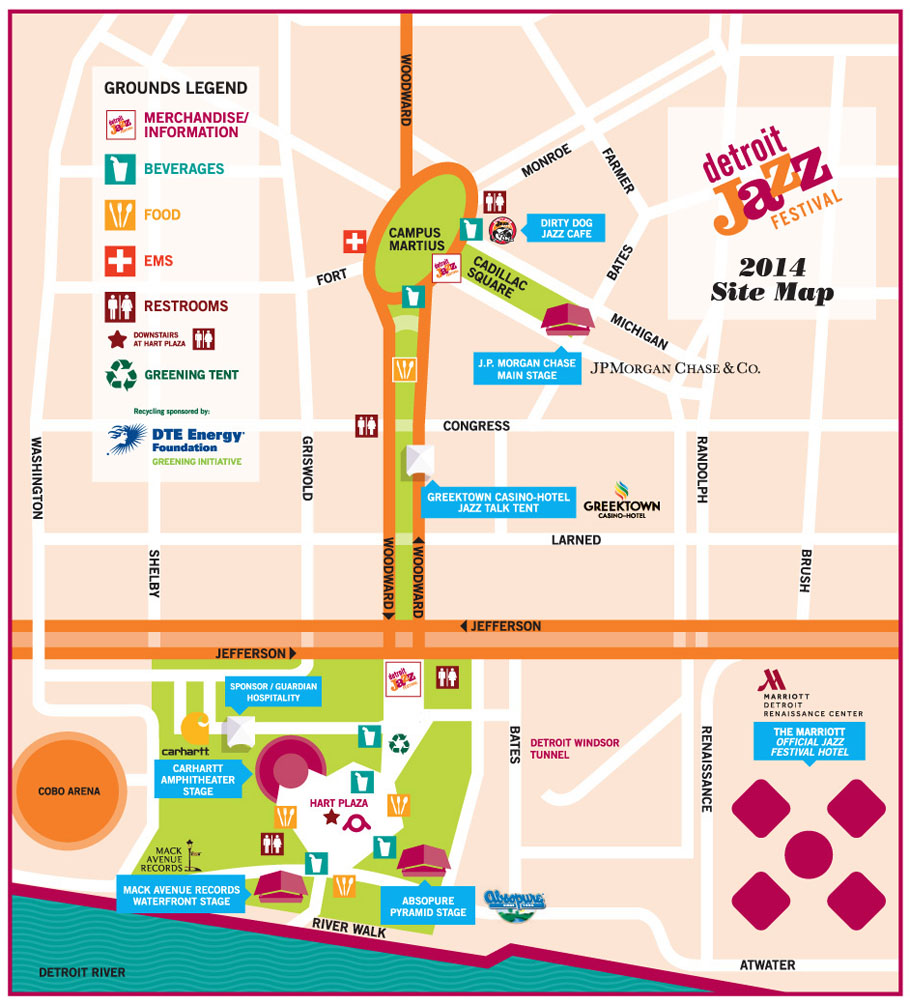| |
35th
Annual
Detroit
Jazz
Festival
Brings
Jazz
Legends
Downtown
World’s
largest
free
jazz
festival
jams out
in Hart
Plaza,
Campus
Martius
Labor
Day
weekend
DETROIT
- At the
Detroit
Jazz
Festival
Chrysler
Jazz
Talk
Tent,
Artist
In
Residence
Joshua
Redman
revealed,
“I’m
just
blown
away by
the
breadth
and
depth of
the
music
presented
here.”
A stroll
through
the
entire
campus
of the
Festival
at a
particular
hour of
the
evening,
one
could
hear the
funky
blues of
the Lou
Donaldson
Organ
Quartet,
vocalist
Freda
Payne
fronting
the
Airmen
of Note
Big
Band,
down
Woodward
you’d
hear
Randy
Weston’s
African
Rhythm’s
Septet.
Then the
impeccable
swing of
the
Christian
McBride
Trio.
But of
all the
great
music I
heard on
Saturday,
nothing
compared
to the
transcendent
set by
Pharaoh
Sanders’
Quartet.
At 73
years of
age,
Sanders
is an
iconic
figure
in
improvised
music.
Heavily
influenced
by jazz
legend
John
Coltrane,
(4 For
Trane is
one of
his
classic
Impulse
LPs),
Sanders
would
later
play and
record
with the
tenor
giant.
Interestingly,
it was
more of
a mutual
collaboration,
with
both men
drawing
inspiration
from
each
other.
Pharaoh
began
the set
by
kicking
over a
music
stand, a
metaphor
for his
radical
approach
to the
tenor as
an
instrument,
and his
entrance
on the
jazz
scene in
general.
On
Saturday,
he
played a
blend of
straight
ahead,
tender
ballads
and the
fire
music
that
made him
famous.
His
quartet
was
rounded
out by
Joe
Farnsworth
on
drums,
Nat
Reeves
on bass
and
William
Henderson
on
piano.
They
kicked
off an
uptempo
swinging
number,
and
Pharaoh
hit a
few
foghorn
low
notes in
the
midst of
his
rapid
runs.
Nat
evidently
had some
problem
with his
hand
after
the
first
number,
and as
it was
being
addressed
Pharaoh
hit the
first
few
notes of
Coltrane’s
ballad,
#8220;Naima”.
One of
the cool
things
about
the
Detroit
Jazz
Festival
is
watching
the
artists
check
each
other
out.
Trombonist
Steve
Turre
listening
to
Pharaoh
backstage,
or
vocalist
Kevin
Mahogany
acting
like a
wide
eyed fan
shooting
pictures
from the
lip of
the
stage.
As the
last
note of
the
famous
coda for
Naima
was
played,
Pharaoh
burst
into a
series
of
furious
shrieks
that set
off
“Freedom”,
a wild
foray
that
inspired
the
tenor
player
to
engage
in
leading
the
audience
in
clapping
and call
and
response
vocals.
He even
began a
kind of
marching/shuffling
dance
step
that
included
some
deep
squats.
These
three
extended
numbers
would
have
made for
a
satisfactory
set, and
had
already
included
two
standing
ovations
by the
audience,
when
Pharaoh
played
the
opening
notes to
“The
Creator
Has A
Master
Plan”.
Sanders
has a
deeply
spiritual
perspective,
encompassing
something
boundless,
and this
piece is
one of
his most
deeply
felt
compositions.
And he
still
wasn’t
done.
A piece
that
featured
a
Calypso
riff, a
ballad
the
included
the
line,
“Save
our
children,
they’re
dying…
Now’s
the time
for
inspiration.”
And he
finished
with
another
Coltrane
composition,
“Giant
Steps”
(once
described
as the
Sistine
Chapel
of BeBop).
There is
something
in
Pharoah’s
musicianship
that
defies
the
ability
of
linguistics.
Maybe
it’s (in
the
words of
Joshua
Redman)
the
‘breath
and
depth’
of the
music he
presents.
The
tenderness
of his
ballads,
the
anguish
of his
shrieks.
He’s one
musician
who
really
changed
what the
saxophone
can
encompass.
And his
music,
rather
than
being
evocative
of a
specific
era,
sounds
today to
be
timeless.
Mike
Stratton
is the
author
of the
novel
Everybody
Dreams.
He hosts
the jazz
radio
program
The
Vinyl
Side of
Midnight
on
89.7FM
WLNZ,
LCC
Radio.
For more
information,
the full
list of
performers
and
performance
times,
after
hours
jam
session
schedule
and
more,
please
visit
www.detroitjazzfest.com.
|



